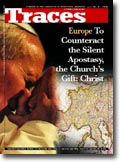
Traces N.8, September 2003
Exaltation of the “I”Four years ago, seated at a noisy, companionable dinner at the Meeting [for the Friendship Among Peoples] in Rimini, the Jewish American writer Chaim Potok intoned King David’s Psalm 8, “O Lord, what is man that You are mindful of him, and the son of man that You care for him?” He said that he no longer felt a part of that tradition, but in Rimini he had felt the desire to sing it. Potok died last year. But this song of his has in some way continued and been amplified this year in the encounters of all those who, in Rimini, found again where they came from. And they found something else, too, that was unexpected. We saw and heard this in the words of religious figures like Archie Spencer, a Baptist minister; David Brodman, a rabbi in Tel Aviv; Ali Qleibo, a Muslim; Fr Mauro Lepori, Fr Sergio, and Fr Claudio, who are Benedictine monks; in Cardinal Christoph Schönborn and Msgr Stanislaw Rylko; in men of culture like Joseph Weiler and business leaders like François Michelin. We saw it in the way thousands took part in an event that evidently is born of a Fact whose greatness is out of proportion to the energies of those who brought it about, as well as to any attempt to define or possess it.
What each person comes from, through the tradition and culture that guide him, is a promise, a call to happiness. Laziness, the ideas prevailing today, and the hardships of life at times seem to cover or betray that promise.
In his closing words to the Meeting, Fr Giussani evoked the pity of God, which brought forth in history the adventure of Mary–the first step and method of the mystery of the Incarnation. She welcomes and sustains the desire aroused by that promise, offering herself as the positive response that frees a person’s energies. “Death, where is your victory?” can be the words of the person encountered by Christ, even in the midst of trial. It is the discovery of a prospect, a hope that sinks its roots into something present.
For the certainty of a positivity at work in history–because of which everything is good–is called hope, the thing that can most reasonably mobilize man in every sort of undertaking. Hence, among necessities and limitations, the individual personality finds help and full expression in the life of a people: the exaltation of the “I” takes place, of the poor “I” of each one of us and not of the abstract figure who exists only in the newspapers.
The Meeting was a welcoming and exemplary place of this people that does not claim to have arrived, but strives continually toward the goal.